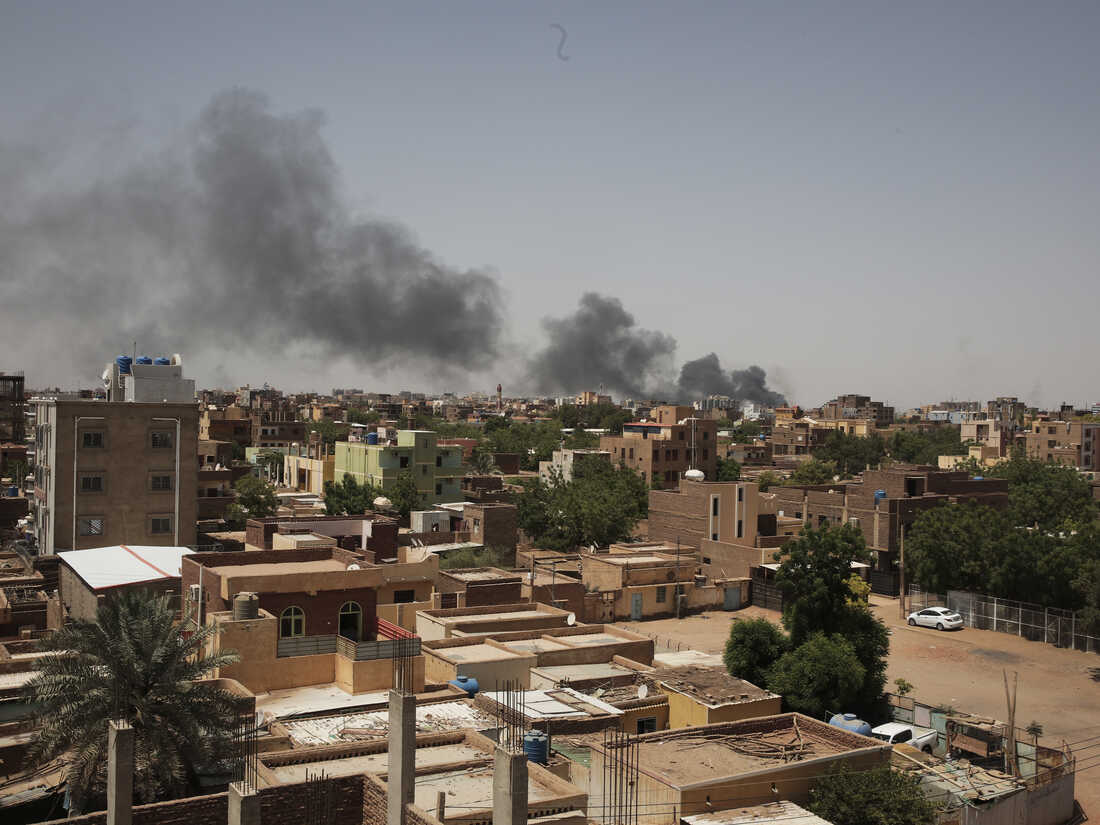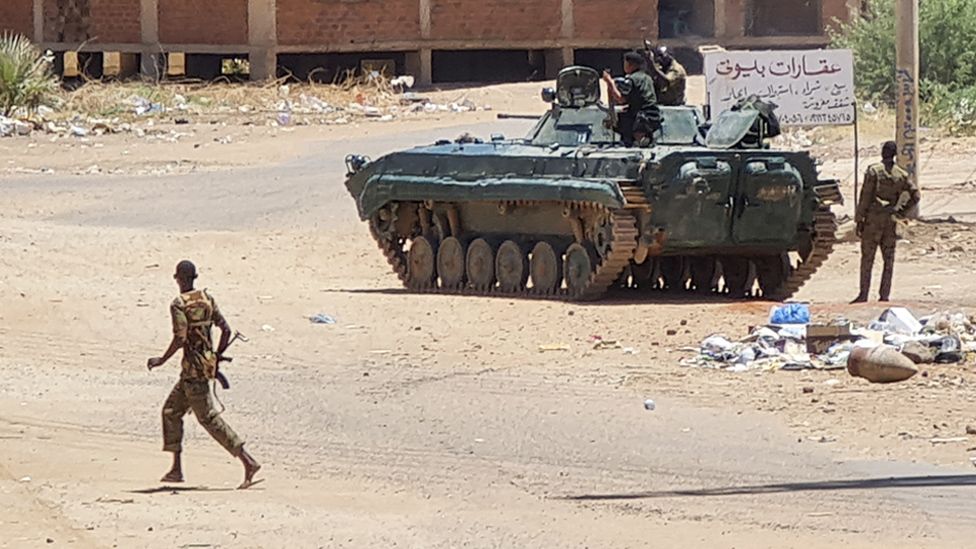Sudan Conflict And Its Consequences In Africa.
Sudan's military junta has followed in the footsteps of its counterparts in other North and Sub-Saharan African countries.

Sudan’s formal army and paramilitary groups have been engaged in an internecine fight for the earlier two months, throwing the country into disaster. One and a half million Sudanese have been internally displaced, with another half a million having to seek asylum in bordering nations.
On one side is President Abdel Fattah al-Burhan, a soldier who ascended to the highest position by climbing the professional ladder, and on the other is Vice President Mohamed Hamdan ‘Hemedti’ Dagalo, the commander of the RSF, who became the head of a special force founded by a past president.

Both leaders are aware that the victor of the struggle will expect supremacy over the country, while the defeated has to accept punishment or exile.
More than 200 military coup attempts to destabilise democratically elected governments have happened all over postcolonial Africa. Only half of these efforts were successful. However, several of those countries had democratic changes between the 1980s and 1990s. However, a fresh wave of coups in recent years has reset the clock. In 2022, there were two coups in Burkina Faso, and unsuccessful coups in Guinea Bissau, the Gambia, and Sao Tome and Principe. There were six such efforts in 2021, four of which were successful.
The new outbreak of violence in Sudan has driven the country down a precipice of uncertainty. What effect will it have on its neighbours and the rest of Africa?
Unfortunately, Sudan’s military junta has followed in the footsteps of its counterparts in other North and Sub-Saharan African countries. To begin, al-Burhan and Hemedti backed the Forces of Freedom and Change, a broad political alliance of civilian activists and rebel organisations opposing Omar al Bashir’s decades-long authoritarian government. Following his dismissal, they seized over the country in 2019, pledging a civilian democratic government. A transitional civilian management was created, but the prime minister was deposed in a coup after 14 months.
Following that, failing to reach an agreement on the construction of an apolitical united army along the lines of a structured agreement signed in December 2022, the two leaders clashed. They have strengthened their positions by taking necessary places and gaining control of oil infrastructure, military factories, critical sites, and towns. Neither side has acquired a clear advantage in the combat, creating the prospect of a protracted confrontation.
Both sides have merits & demerits. The military controls a major part of the country’s economy. The army general is happy by the widespread help among the business sector in Khartoum, the main battleground, and the neo-rich residing in the Nile river basin’s hinterland, who despise the RSF. Furthermore, the military can provide secure supply lines to its forces in different places. RSF soldiers, on the other hand, are ensconced in local areas, out of reach of army jet planes and tanks. However, their logistical capabilities for supplying key combat materials are insufficient. Furthermore, RSF fighters often ignore any line of command.
Because of the dynamics in the region, the international community’s normal response to such circumstances may not work in Sudan. Saudi Arabia & the United Arab Emirates have provided Sudan’s factions with billions of cash to fight opposing parties in Yemen. Sudan’s organisations have accumulated bigger sums of money through smuggling gold and other commodities. As a result, they can stay put for months, if not years.

The United States’ approach has also lead to issues. Sudan’s adoption of the Abraham Accord encouraged then-US President Donald Trump to remove Sudan from the list of state sponsors of terrorism in the year 2020. The junta felt empowered as a result of this.
When the Biden management should have campaigned for a restoration to civilian government in Sudan after the second coup in 2021, it instead pampered the two generals to find ways to give up power, entirely ignoring local politicians. This fueled the generals’ desire for power.
The biggest fear, though, is that the Sudan crisis would have repercussions in neighbouring African countries that are also dealing with insecurity and political instability. It has the potential to spark a security catastrophe not only in this area but all over Africa.
Sudan lies in an area with access to the Red Sea, Indian Ocean, and Gulf of Aden. Its abundant agricultural regions entice nearby nations, who compete for them. Worse, it borders Ethiopia, Libya, Chad, the Central African Republic, Eritrea, and South Sudan, all of which are embroiled in internal wars.
The problem has been exacerbated by the migration of insurgents across these nations’ porous borders. Not just its neighbours but even distant countries such as Tunisia, Tanzania, and Mozambique may be affected by the turmoil in Sudan or face a scenario comparable to that of Sudan.
Ethiopia is said to be using the Sudan’s crisis by accumulating a large number of soldiers near its border in order to seize the long-disputed lush agricultural fields of al-Fasagha, where farmers from both sides have coexisted for decades. The Sudan’s government acquired control of the whole region in 2021, setting the stage for a major confrontation.
South Sudan, which seceded from Sudan and took over more than 75% of Sudan’s oil reserves, is enduring severe economic hardship as a result of security issues with its northern sibling. South Sudan can only export crude through a pipeline that runs through Sudan. Sudan’s present situation has tampered oil exports.
During their country’s protracted civil conflict, more than 2.5 million South Sudanese migrated to Sudan. Many of them are being compelled to return to their native countries. This not only creates a security risk for South Sudan but also increases the strain on the country’s cash-strapped management.

Sudan and Chad have historically maintained necessary social, cultural, and ethnic links, but relations between their governments have been severely strained. Sudan’s Omar al Bashir and Chad’s Idriss Déby both backed rebel and armed organisations against their respective competitors along their extensive border territories. The Sudan’s RSF amassed a large number of soldiers in this region during the last few months of 2022. The new temporary president of Chad, Mahamat Idriss Déby Into, is concerned about the strange movements near his country’s borders.
Sudan’s RSF has been providing sanctuary and weaponry, and ammunition to rebel troops in CAR seeking to overthrow the government in Bangui since the crisis began in 2013. Sudan’s military system benefits from the rich diamond and gold mines on either side of the CAR-Sudan border, which are owned by the Russian Wagner organisation, which is an ally of various CAR rebel groups and currently supports the RSF. The links between the Sudanese war and the CAR crisis might determine President Faustin-Archange Touadéra’s destiny in Bangui.
After seizing power from an elected government in 2021, Mali’s military junta promised to hold elections in 2022 but has failed to do so. The junta has stated that elections will be conducted in 2025, although it is possible that it will retain power.
Senegal, once the glory of African democracy, is now ruled by authoritarian President Macky Sall. He is seeking a third term, which is illegal, and has imprisoned the country’s popular opposition leader, Ousmane Sonko, sparking mass protests. Such situations provide an opportunity for the Senegalese military to assume control.
Tunisian President Kais Saied has appointed loyal military leaders to the country’s highest positions. By dissolving parliament, firing the prime minister, and seizing control of the judiciary and other independent institutions, he has undone all of the victories of the 2011 Arab Spring movement that deposed ruler Ben Ali. Tunisia is ruled by a decree by Saied. Massive protests against his management have taken place over the last two years. A military coup is not unthinkable in these dangerous circumstances.
Libyan warlord Khalifa Haftar is supplying RSF with gasoline, guns, and other supplies. Several trucks delivering petroleum from the Libyan Al-Jawf refinery have already arrived to RSF outposts in Sudan, according to reports. The success of RSF will encourage Haftar, whose troops control major portions of Libya, including the nation’s important oil reserves, to press its Government of National Unity for additional concessions during peace talks.
Another major impact of the Sudanese conflict will be felt over more than 3 million square kilometres of Africa’s Sahel area, which stretches from the west to the east of the continent. This semi-arid stretch of barren, sandy, and rock-strewn country has become a safe haven for militant organisations like Boko Haram, the Islamic State, and al Qaeda. They routinely launch large-scale strikes from bases in Burkina Faso, Mali, and Niger.
Sudanese power vacuum will provide these organisations with even more operational areas. The G5 Sahel was founded in 2014 to put a halt to these operations. However, the lack of substantial international military backing bore little fruit.
Thus, the continuation of the current crisis in Sudan would undoubtedly worsen the already complex situation in the Horn of Africa and the broader Sahel area. When Sudan’s bordering countries have become involved in either side of the conflict, the area risks devolving into a protracted civil war. International players with major economic and geopolitical interests in Sudan, including Saudi Arabia, the United Arab Emirates, and Russia, will not stand by.
The Sudanese conflict, being a regional issue, necessitates a regional solution. Instead of relying on outside mediators, which have already rendered several ceasefire agreements mediated by the US and Saudi Arabia ineffective, the EAC, IGAD, Ecowas, and the African Union must step instantly to find a solution.
Conclusion.
Military coups were common in postcolonial Africa, although many countries restored to democracy in the 1980s and 1990s. A fresh wave of coups has recently reset the clock. The outbreak of hostilities has driven the country down a precipice of instability. What effect will it have on its neighbours and the rest of Africa?




